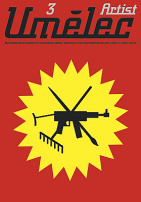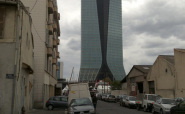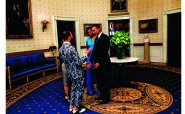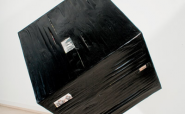| Zeitschrift Umělec 1998/3 >> A Play on Art: Art Book | Übersicht aller Ausgaben | ||||||||||||
|
|||||||||||||
A Play on Art: Art BookZeitschrift Umělec 1998/301.03.1998 George Gessert | anarchie | en cs |
|||||||||||||
|
It is not immediately apparent that all of David Stairs’ artists’ books were done by the same person. Automatic Ambiance is in the form of long black-and-white photostrips, and documents a night spent in a photobooth. Tactical Aesthetics has a conventional format. Pages of text alternate with full-page color photographs of dioramas. In one diorama, toy soldiers march through a plate of blintzes. In another, clothespins crush combatants. The text describes a chaotic art war in which various factions, including the Arts Revolutionary Council, Formalists, Giant Wahoos, and Savidges are pitted against one another. Boundless cannot be opened. It is a circular artists’ book, wirebound around its entire circumference. Asperity is a collection of texts screeprinted on sandpaper. Each page contains two sets of facts: one regarding a non-industrial culture, the other regarding our own. My Art Book consists of color reproductions of Stairs’ gouache paintings tipped into a line notebook with handwritten commentary accompanying each work.
Running through these works are some common concerns. Stairs has an ongoing interest in art as an elaborate form of play. What does it mean to see art as a play? Each of Stairs’ bookworks suggests different answer to that question. Automatic Ambiance is part joke, part exploration of book form, and part performance. It draws attention to itself through audacity and wit. The nude self-portraits in Automatic Ambiance seem not so much exhibitionistic as insistent that art be adventurous and inclusive. Tactical Aesthetics moves from play to games. In addition to employing the most literal imagery of games, toy soldiers, Tactical Aesthetics announces itself as a manifesto. But it declares no intention except one: to manuever among the multitude of forces in the art world. With such an intention, Stairs’ eclecticism would seem to be less a matter of esthetic or philosophical commitment than of opportunism. But Stairs avoids the pitfalls of cynicism by not lingering with the kinds of eclecticism that look most contemporary. In his next book, Boundless, Stairs plays with what art in the 1980s at its most visible and superficial rebelled against: Greenbergian esthetics. Boundless takes the book form to a logical extreme, the unopenable book. Here the book becomes totemic object, a formalist exercise that only partly negates its own formalism by using the most everyday materials and proceses, such as laminated covers. After Boundless, Stairs’ interest in play and games deepens to include a vast range of human activities. My Art Book and Asperity involve comparisons between seeming primitive societies and our own. Stairs finds more similarities than differences. In My Art Book, Stairs’ finest artists’ book, in my opinion, wild animals freely mingle with human beings, and the whole artifice of civilization appears to be only a twist of nature playing itself out according to rules at best imperfectly misunderstood by the players. Play in Stairs’ work involves aspects of life as light as fashion, and as serious as the nature of power, what began with a night in a photobooth evolved into works in which the artist is scurely pitted against opponents as formidable as vanity, cynicism, and despair. Technically Stairs is something of a virtuoso. Sometimes he gets tangled in his own cleverness, especially in his prose, but also occasionally in his choice of materials, such as sandpaper, which is forbiddingly difficult to print on. But like Coyote, he usually extricates himself at the last minute. In the process he entertains, extends book form, and holds up a mirror to the human condition.
01.03.1998
Empfohlene Artikel
|
|||||||||||||





Kommentar
Der Artikel ist bisher nicht kommentiert wordenNeuen Kommentar einfügen